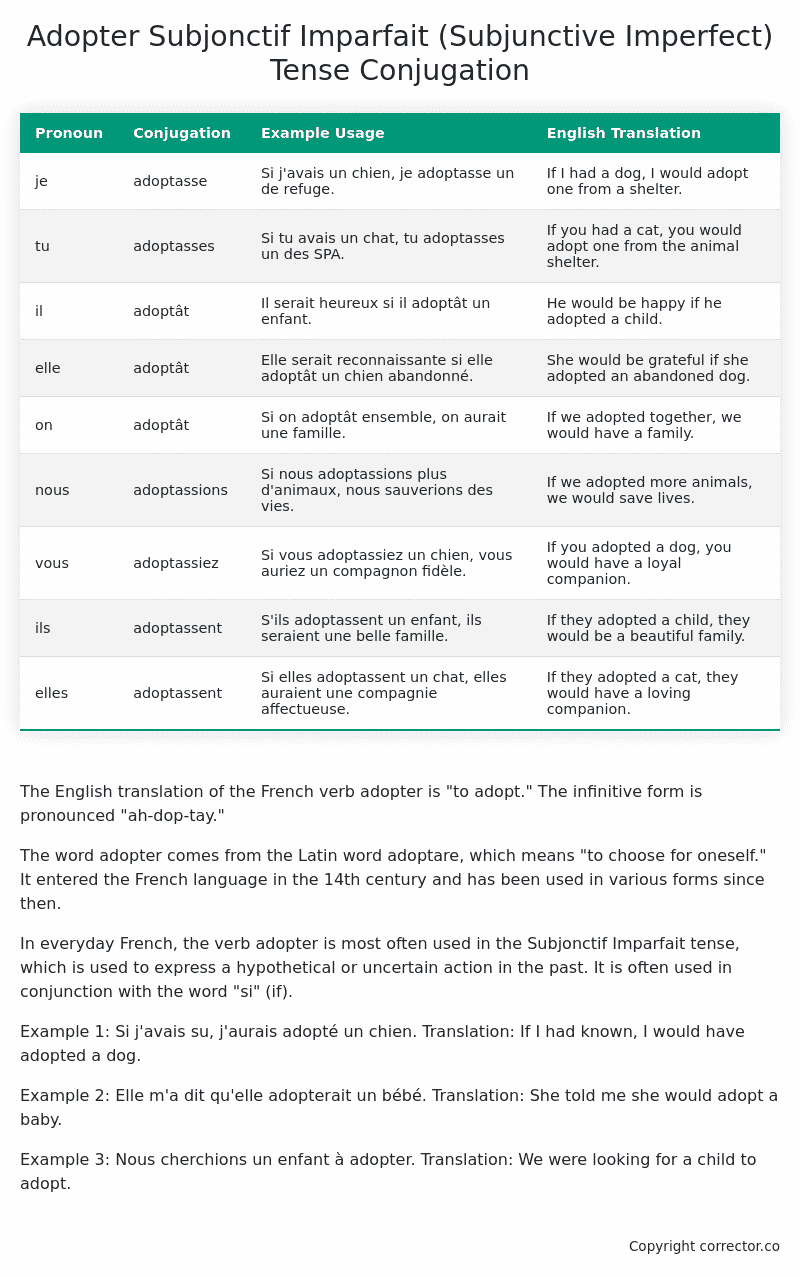Subjonctif Imparfait (Subjunctive Imperfect) Tense Conjugation of the French Verb adopter
Introduction to the verb adopter
The English translation of the French verb adopter is “to adopt.” The infinitive form is pronounced “ah-dop-tay.”
The word adopter comes from the Latin word adoptare, which means “to choose for oneself.” It entered the French language in the 14th century and has been used in various forms since then.
In everyday French, the verb adopter is most often used in the Subjonctif Imparfait tense, which is used to express a hypothetical or uncertain action in the past. It is often used in conjunction with the word “si” (if).
Example 1:
Si j’avais su, j’aurais adopté un chien.
Translation: If I had known, I would have adopted a dog.
Example 2:
Elle m’a dit qu’elle adopterait un bébé.
Translation: She told me she would adopt a baby.
Example 3:
Nous cherchions un enfant à adopter.
Translation: We were looking for a child to adopt.
Table of the Subjonctif Imparfait (Subjunctive Imperfect) Tense Conjugation of adopter
| Pronoun | Conjugation | Example Usage | English Translation |
|---|---|---|---|
| je | adoptasse | Si j’avais un chien, je adoptasse un de refuge. | If I had a dog, I would adopt one from a shelter. |
| tu | adoptasses | Si tu avais un chat, tu adoptasses un des SPA. | If you had a cat, you would adopt one from the animal shelter. |
| il | adoptât | Il serait heureux si il adoptât un enfant. | He would be happy if he adopted a child. |
| elle | adoptât | Elle serait reconnaissante si elle adoptât un chien abandonné. | She would be grateful if she adopted an abandoned dog. |
| on | adoptât | Si on adoptât ensemble, on aurait une famille. | If we adopted together, we would have a family. |
| nous | adoptassions | Si nous adoptassions plus d’animaux, nous sauverions des vies. | If we adopted more animals, we would save lives. |
| vous | adoptassiez | Si vous adoptassiez un chien, vous auriez un compagnon fidèle. | If you adopted a dog, you would have a loyal companion. |
| ils | adoptassent | S’ils adoptassent un enfant, ils seraient une belle famille. | If they adopted a child, they would be a beautiful family. |
| elles | adoptassent | Si elles adoptassent un chat, elles auraient une compagnie affectueuse. | If they adopted a cat, they would have a loving companion. |
Other Conjugations for Adopter.
Le Present (Present Tense) Conjugation of the French Verb adopter
Imparfait (Imperfect) Tense Conjugation of the French Verb adopter
Passé Simple (Simple Past) Tense Conjugation of the French Verb adopter
Passé Composé (Present Perfect) Tense Conjugation of the French Verb adopter
Futur Simple (Simple Future) Tense Conjugation of the French Verb adopter
Futur Proche (Near Future) Tense Conjugation of the French Verb adopter
Plus-que-parfait (Pluperfect) Tense Conjugation of the French Verb adopter
Passé Antérieur (Past Anterior) Tense Conjugation of the French Verb adopter
Futur Antérieur (Future Anterior) Tense Conjugation of the French Verb adopter
Subjonctif Présent (Subjunctive Present) Tense Conjugation of the French Verb adopter
Subjonctif Passé (Subjunctive Past) Tense Conjugation of the French Verb adopter
Subjonctif Imparfait (Subjunctive Imperfect) Tense Conjugation of the French Verb adopter (this article)
Subjonctif Plus-que-parfait (Subjunctive Pluperfect) Tense Conjugation of the French Verb adopter
Conditionnel Présent (Conditional Present) Tense Conjugation of the French Verb adopter
Conditionnel Passé (Conditional Past) Tense Conjugation of the French Verb adopter
L’impératif Présent (Imperative Present) Tense Conjugation of the French Verb adopter
L’infinitif Présent (Infinitive Present) Tense Conjugation of the French Verb adopter
Struggling with French verbs or the language in general? Why not use our free French Grammar Checker – no registration required!
Get a FREE Download Study Sheet of this Conjugation 🔥
Simply right click the image below, click “save image” and get your free reference for the adopter Subjonctif Imparfait tense conjugation!

Adopter – About the French Subjonctif Imparfait (Subjunctive Imperfect) Tense
Formation
Common Everyday Usage Patterns
Interactions with Other Tenses
Subjonctif Présent
Indicatif Passé Composé
Conditional
Conditional Perfect
Summary
I hope you enjoyed this article on the verb adopter. Still in a learning mood? Check out another TOTALLY random French verb conjugation!


